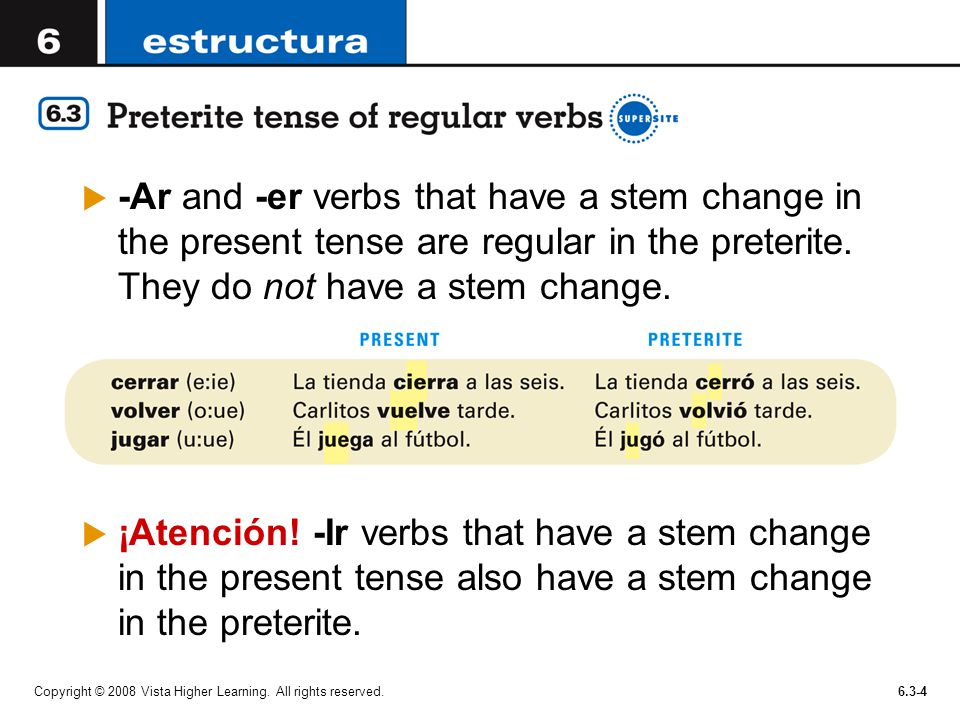Does Jugar Stem Change In The Preterite
Since jugar is an irregular verb in Spanish, you'll need to commit its various verb conjugations to memory if you want to play along. It's stem changes from o → ue in all conjugations except for the nosotros and vosotros forms. Preterite. The endings for stem-changing verbs are the same as for regular -AR, -ER, and PODER – can, to be able to In jugar, the U changes to UE (juego, juegas). Verbs that end in -gar change g to gu. Verbs that end in -car change c to qu. Verbs that end in -zar change z to c. Examples: jugué (jugar) busqué (buscar).
And remember, never, ever, translate, as it will irreparably impair your ability to learn a new language. The Imperfect is the easiest tense to learn in Spanish because the conjugations are almost completely regular: there are 3 irregular verbs! For example, "caminaba" can mean "he used to walk" or "I was walking. Still it is easy: Remember the present tense of verb "Haber" minus "h" and add to the infinitive form of the verb.
e to ie stem changing verbs and jugar
In this tense, the action is conditioned to something to happen. Use conditional for asking in polite form like in English with would. Or use it to form conditional expresions.
These changes in the conditional tense apply even to the verbs SerEstar and Ir! The meaning is not the same as in English: Something that has been done in the past but still important in the present or continue by the moment. Well usually in Latin America they almost never use this tense and mix the past perfect and simple past you have to adapt the meaning.
Usually people from Spain use the tense properly but in Latin American to use this tense could show some fancy - elevated studies language that is not the normal rule or can be comic to some one from there.
Preterite of stem-changing verbs
Stem-Changers in the Preterite. Java Games: Preterite of -Ar verbs. Patterns Game: Preterite Tense of normal verbs. Hangman: Preterite of reflexive verbs.

Challenge Board Regular Preterite. Battleship: Preterite Stem-changers. Colby: Practice conjugating the Preterite with a variety of exercises. Challenge Board: Practice all Preterite forms regulars, stem-changers and Irregulars.
This lesson covers the Spanish verb 'jugar', which means 'to play' (a sport or game). Did you play any sports or games during the weekend? small change in the first person, so you will just need to take its stem (jug-) and add the preterite . If you're going to master Spanish verbs like jugar, you need to be able to identify Jugar doesn't undergo a stem change in the preterit, but it does undergo a.
Based on a work at www. Spelling changes in the Preterite occur because the Preterite vowel endings affect the way some consonants sound. In the present tense, Jugar conjugates as. But look at the yo form! The "u" makes the "g" hard without changing the " é " vowel sound.

The spelling changes result from an effort to reflect the correct pronunciation. But again, look at the yo form! Remember the Spanish "c" in front of "e" is pronounced like an English "s". To make it plural we add "es".
But the Z isn't paired with the soft vowels E and I.

Spanish is very mathematical and reliable: when there is a rule like the Z to C change in front of the soft vowels, Spanish will always enforce this change. Another group of verbs with spelling changes are -Er and -IR verbs that have double vowels in their endings like: Leer, Oír, Caer :.
Otherwise the "i" is overwhelmed by the stronger vowel and becomes a glide. The Spanish " i " is the poodle of the Spanish Vowel. It is too weak to be heard between the " o " and the " e ".

We saw this occur in the Present Progressive.
Conocido Por El Sexo UdiasQuien Cumple Anos Manana Famosos